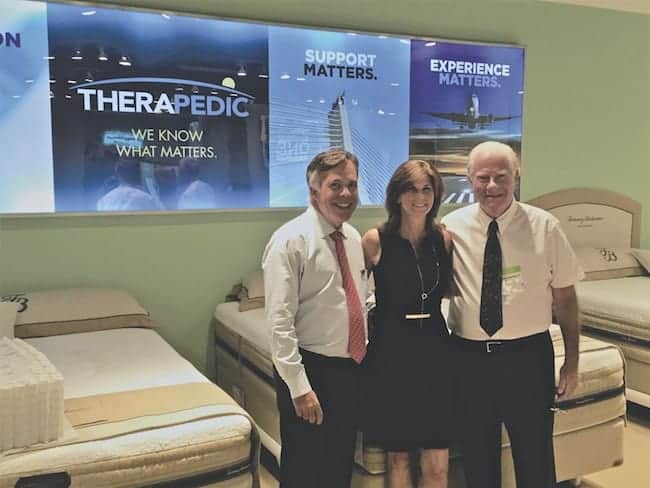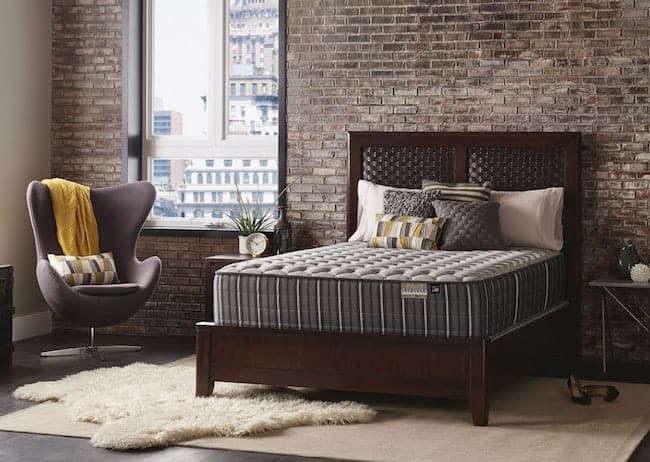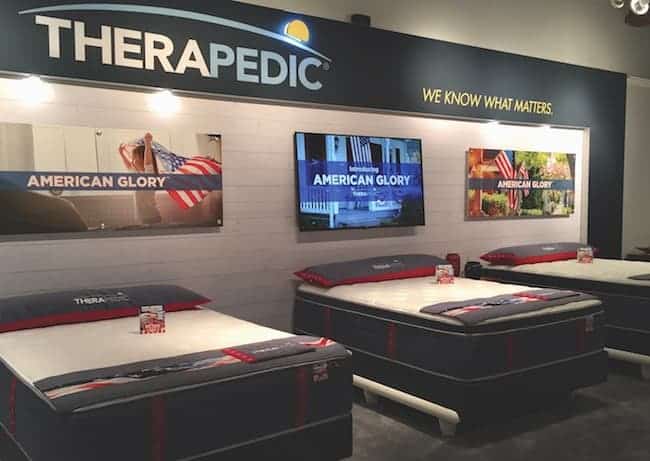Licensing group benefits from committed partners and ability to stay nimble

Therapedic International principals include Gerry Borreggine (left), president and chief executive officer; Susan Mathes, vice president of brand relations; and Norman Rosenblatt, super-majority owner of the licensing group and owner of Therapedic New England.
As a midtier licensing group, Therapedic International holds a unique position in the marketplace, according to Gerry Borreggine, president and chief executive officer of the Princeton, New Jersey-based company.
“We have the resources and clout to compete head to head with the majors,” Borreggine says. “In a market where two large companies account for the majority of sales, we offer retailers an attractive brand alternative with a full range of profitable, high-value products. We’re the nimble, flexible player who can do things the big guys can’t do.”
At the same time, Borreggine adds, Therapedic’s network of licensed manufacturing partners offers the flexibility of a smaller-scale producer. “Our strong family of licensees enables us to respond quickly to sudden shifts in the market and tailor our products and programs to meet the needs of retailers of all sizes,” he says. “We run our company like a family business — if it makes sense, we’re going to do it.”
An example of Therapedic’s responsiveness is its expanded boxed-bed program introduced at the Winter Las Vegas Market Jan. 27-31. It includes three Whisperbed models — promotionally priced, hybrid boxed mattresses with a coil system from Leggett & Platt Inc. — as well as two boxed additions to the company’s American Glory line, with suggested retail prices of $599 and $699 for queen size.
The new models join Therapedic’s first entry into the category, the Agility bed. Introduced in 2013, Agility is a premium hybrid compressed mattress retail priced at $1,099 that Borreggine says is targeted to the “Pottery Barn mom.” The bed has its own dedicated website (AgilityBed.com), as well as a broad array of online promotional efforts, including social media, search engine optimization campaigns, affiliate marketing programs with mattress reviewers, and blogger outreach.
“The future of the mattress business will be delivered to retailers and consumers in a box,” Borreggine says. “While we’ve dabbled in boxed beds in the past, this January’s introduction represents our first big push into the category. We feel that with the features and price-performance ratios that Whisperbed and the new American Glory systems offer, we will not only play a part in that future, we will help shape it.”
The trend toward merchandising, selling and delivering mattresses compressed in a compact box will only accelerate, according to Borreggine. “It’s an evolution, not a revolution, but the marketplace has clearly decided that this concept of having mattresses delivered in a box is valuable,” he says. “Within the next three years, as compression technologies improve, we think 75% to 80% of mattresses will be shipped and delivered in a box. It’s a challenge the entire industry will have to meet, even if the trend hasn’t hit every market yet.”
In the near term, the move toward boxed beds will continue to drive down prices, Borreggine says. “Much of the boxed business takes place at $699 to $799, but our goal is to educate the consumer and move that range up over time,” he says. “To do that, we’ll need to find a way to deliver a higher level of quality, features and value in each box so that the consumer is willing to step up.”
Bravura strikes a chord
Therapedic offers a full range of innerspring, hybrid and foam mattresses retail priced from $599 to $3,999. Popular collections include the licensed Tommy Bahama line of innerspring and hybrid models; BackSense, an innerspring line with Therapedic’s exclusive HourGlass Back Support element for increased firmness in the shoulder, hip and lumbar areas; PureTouch, which includes three new latex models; and Bravura, an assortment of innerspring and hybrid mattresses introduced in April 2017 at the High Point Market in High Point, North Carolina.
“Bravura has proven to be one of our biggest hits in recent years,” Borreggine says. “Retailers like the depth and cohesiveness of the line, which appeals to a broad range of consumers, and the musically inspired merchandising helps position the models in a manner that’s easy to relate to.”
Bravura models include Silk Degrees ($1,299 to $1,999 in queen), Moondance ($1,599 to $2,499), Rubber Soul ($1,799 to $2,999) and Summer Nights ($1,999 to $3,999). Top-of-bed labels sport a whimsical keyboard positioned under the Bravura logo, which in turn features an eighth note as part of the design.
“The features and benefits of Bravura, coupled with the marketing opportunities from the musical themes, have helped these sleep systems go to the top of the charts,” says Borreggine, an avid music fan and guitarist. (See story on page 20.)
Another relatively new line Borreggine says shows strong promise is American Glory, with three models priced from $799 to $1,199. American Glory, introduced in 2018, is a “made in the USA” line designed to provide retailers with a highly promotable product for key holiday sale periods. The line features edge-to-edge pocket coil construction in the adjustable-friendly mattresses and built-in USB ports in the foundations.

Therapedic’s musically themed Bravura collection has proven to be a strong seller. Beds are named for well-known albums: Silk Degrees, Moondance, Rubber Soul and Summer Nights.
“The collection’s theme, ‘Make America Sleep Great Again,’ gives retailers the ability to tie in with many U.S. holidays and events,” Borreggine says. “From Presidents Day to Memorial Day and from the Fourth of July and Labor Day through Election Day, American Glory provides year-round promotional opportunities with a great product at a terrific value.”
Therapedic sells its mattresses through leading bedding specialty shops and full-line furniture stores. With the number of brick-and-mortar locations shrinking because of ongoing consolidation and closures in the retail sector, the company works hard to strengthen its existing relationships, while forging new partnerships with up-and-coming merchants. The bulk of the company’s sales continue to take place through traditional stores, but it has a limited presence with online retailers such as Wayfair.
“The retail landscape is changing. To survive and grow, we need to become even more important to the remaining players,” Borreggine says. “We also are getting more active in the digital space, providing brick-and-mortar retailers with the tools and programs they need to be successful.”
Holistic view of the industry
Borreggine started his mattress industry career at 40 Winks, a bedding specialty store started by his father. Frank Borreggine, also known in the industry as Frank Barr, launched the business in 1977 in Philadelphia and eventually grew it into a chain of 23 stores in the Philly metro area and New Jersey. Gerry Borreggine joined 40 Winks in 1981 and helped run the business with his father and sister Holly Dugan for 21 years. He left to join Therapedic in 2003 and, in 2004, was promoted to CEO.
After several years of working at Therapedic, which has long relied on a licensing model, Borreggine realized the company had more contract factories producing its line than necessary. From 2006 to 2009, Borreggine cut the number of Therapedic’s U.S. factories from 14 to eight to maximize profits and efficiencies. “We were like a tree with too many limbs, and we needed to prune back to grow better,” he says. The number of domestic partners has climbed back up in recent years to 10 licensees serving 11 U.S. regions, but the “quality of the group has dramatically improved,” he says.
A similar culling took place on the international side of the business. “We set out to eliminate the weaker players who were no longer engaged with our mission and replace them with a smaller group of stronger partners with a true passion for our line,” Borreggine says.
The process is ongoing, Borreggine says, but in his first decade on the job, he cut the international licensee count from 50 to less than half that. In Asia alone, the number of licensees dropped from 10 to three key players — and “they’re doing more than 10 times the business we did there before,” he says.
In choosing a licensing partner, Therapedic puts a high priority on people and relationships, Borreggine says. “The decision is more than whether they have the newest equipment, biggest plant or largest account roster. We look at the quality of the people and whether there’s a solid connection between us,” he says. “Our licensing family is a very collegial group and we want partners who can work collaboratively to build our brand.”
Therapedic’s global licensing partners include the Airland Group in China, the country’s second-largest bedding producer, which is led Sze Man Yuen; Massindo Group in Indonesia, led by Jeffri Massie; and, the newest addition, Hava’s Mattress Co. in Vietnam, operated by the Nguyen family. It distributes Therapedic’s line throughout Cambodia, Laos, Myanmar, Thailand and Vietnam. Also new to the group is Artaban Internacional, led by Alejandro Rodriguez Gamboa, in Mexico.
Therapedic now has 24 global manufacturing partners in Africa, Asia, Europe, the Middle East and South America. In addition, Therapedic has more than a dozen other licensed manufacturing partners making top-of-bed accessories and other comfort products for retailer Bed Bath & Beyond.
“As we re-established our global licensing network, we developed a new system of perpetual licensing that creates a deeper bond with special partners,” Borreggine says. “For a price, the licensee gains perpetual rights to produce and sell our brand. This gives them a new level of confidence that we won’t suddenly raise our licensing fee or drop them, and it gives us a stronger partner who has more ‘skin in the game’ with a long-term commitment to our brand.”

Denver-based Old West Mattress Co., Therapedic’s Colorado licensee, moved to this new 85,000-square-foot facility in late 2017.
In an era during which some competitors are moving away from the licensing model in favor of in-house production, Therapedic remains committed to its network of domestic and international partners. “We are the largest licensing group left standing,” he says. “We think our approach remains very viable, and we expect to continue on this track for many years to come.”
In 2008, one of the domestic licensees, Norman Rosenblatt of Therapedic New England, began to acquire a majority stake in Therapedic International. Today, he is the super-majority shareholder, which, Borreggine says, has solidified the organization. “Having a sole majority owner, especially one who is invested in the group and the brand, has stabilized the group,” he says.
The arrangement also has helped Therapedic obtain new international licensees, who like the fact that there is an owner who is part of the brand’s investment, according to Borreggine. “In addition, Norman has been a great leader and mentor for the group. He’s engaged in the process of what we do, but not overbearing in his influence,” he says. “We are lucky to have him.”
Brand power
One of the cornerstones of the company’s success is the power of its brand name. “The Therapedic brand has been in the marketplace for 60 years, and our name recognition continues to grow — both at home and abroad,” Borreggine says.
A big factor contributing to that name recognition is Therapedic’s long-term relationship with the Bed Bath & Beyond chain. Since 2003, Therapedic has provided an exclusive line of pillows, mattress pads, mattress toppers, sheets, pet beds, and heated and weighted blankets to more than 1,000 stores in all 50 states. The relationship started small, with a basic line of pillows and, over time, has expanded to the point where Therapedic is now the retailer’s “No. 1 utility bedding brand,” Borreggine says. Recently, Therapedic expanded its presence — both in-store and online — to include kitchen devices, window treatments, floor mats, chair pads and slippers.
“Bed Bath & Beyond has been an extraordinary customer for us,” Borreggine says. “Every day, more than 1,000 customers come through each of their stores. That’s an incredible level of exposure for us — and a gateway for future mattress sales, since if a customer likes our pillows and blankets, they’re more likely to think of us when they need a bed, too. They can spend $50 on a pillow and, if they like that, feel much more inclined to buy a $1,000 or $2,000 Therapedic mattress.”
Adding to the awareness is a separate licensing program Therapedic launched with Copper River Home in 2017 involving a line of health and wellness seating. The line, which is marketed through Wayfair, Amazon and other major online and brick-and-mortar retailers, includes Therapedic-branded lift chairs, massage chairs, office seating and swivel recliners.
To measure brand perception for the products it sells at Bed Bath & Beyond, Therapedic conducts a biennial consumer survey. The results of the most recent, done in late 2017, show “consumers definitely know and understand the Therapedic brand,” says Susan Mathes, vice president of brand relations. “They gave us particularly good grades on comfort and quality, and our pillows, mattress pads and toppers were judged to offer the highest perceived value within those categories.”

The American Glory collection, displayed here in the company’s Las Vegas Market showroom, is among the recent additions to Therapedic’s mattress line.
The survey also showed Therapedic is building favorable relationships with a growing number of consumers, a trend reflected in the company’s sales. Therapedic’s top-of-bed business at Bed Bath & Beyond has grown by almost 300% in the past 10 years, Mathes says.
Therapedic’s high name recognition is an asset when it comes to competing with the top mattress brands, she adds. It also is a point of differentiation with the next tier of bedding producers, whose names may not be as well-known to consumers.
“We may not compete with the other ‘second-tier’ brands as well on price since our factories are bigger and we have more marketing expenses,” Borreggine says, “but the fact that the consumer knows us and trusts us gives us a different value proposition.”
Thinking digital
Therapedic’s ability to provide retailers with a wide range of point-of-purchase materials and ad support is another asset, Mathes says. In the past year, the company has become much more active online, developing a new program of digital marketing in partnership with Promoboxx, a Boston-based retail brand marketing specialist. The service provides Therapedic, its licensees and its retailers with fresh content they can use on their own websites, in social media and through marketing initiatives.
“We started last June with a test, and we now are working on a range of digital assets that will be uploaded to this platform,” Mathes says. “Soon, retailers will be able to click on a button and download brand-specific content for use in their own marketing.”
She adds: “Having a robust inventory of content available at all times will help us gain even more exposure for our brand since it will make it easier for our retailers to do their own promotions on social media and other channels.”
In December, Therapedic conducted a contest through the Promoboxx platform that rewarded retailers for posting Therapedic materials on their Facebook pages. “We expect to work more closely together on these sorts of joint promotions so that we can leverage the strength of our dealer base from coast to coast,” Borreggine says.
In addition, Therapedic plans to continue to support retailers’ traditional media efforts. “We developed a new ad calendar for 2019 that has about 50 pages of graphics that stores can use for print advertising or email blasts and banner ads,” Mathes says.
Borreggine’s diverse background — in addition to his mattress retailing and manufacturing experience, he’s also been the owner of a marketing company — has served him well when it comes to supporting Therapedic’s community of licensees and retailers. “I understand what the factory owners face because I was both their customer and their supplier at one time, and I also can relate to our retailers because I’ve been in their shoes, too. We’re all in this together, so my goal is to do everything I can to ensure we all stay successful and grow.”
According to Borreggine, 2018 was a good year for Therapedic, with both volume and dollars up about 5%. He expects similar growth in 2019. “There’s still a lot of uncertainty in the marketplace with the trade situation and the volatility in raw material pricing,” he says. “But we are excited about our prospects for this year, especially with the remerchandising we’re doing to make our line more boxed-bed compatible.”
5 Fast Facts About Therapedic International’s Gerry Borreggine
- In July 1978, Gerry Borreggine and his wife, Regina, spotted Beach Boys’ wunderkind Brian Wilson walking alone on Mission Boulevard in Pacific Beach, California. The couple, on their honeymoon at the time, gave Wilson a ride, talked music and family with the musician, and had dinner with him at a Mexican restaurant. Later, Wilson put on an impromptu piano performance at the house of Borreggine’s grandparents. A lifelong fan of the band, Borreggine also is a musician. He played guitar with a group in high school and continues to perform as part of the all-industry band, the Insomniaczzz.
- Borreggine’s father, Frank Borreggine, was a home furnishings buyer for Lit Brothers department store in Philadelphia, and he attended the High Point Market in High Point, North Carolina, as a boy. Borreggine says he learned a lot about relationships and how to treat people from watching his father at work.
- Borreggine graduated from Rutgers University, where he studied business and journalism and served as editor in chief of the school newspaper. He also wrote a music column and, in that role, received a demo of Bruce Springsteen’s “Born to Run” album before it was released to the public.
- Borreggine’s hobbies include reading — especially books about U.S. history and the country’s presidents — and wine. He enjoys collecting California vintages in a newly completed wine cellar in his home. And, with a lifelong love of the beach, he also has a condo at the Jersey Shore.
- He has been honored with three industry awards from the International Sleep Products Association: the Russell Abolt Exceptional Service Award in 2018; the MacMorran Memorial Award in 2002, when he was still a retailer; and the ISPA Izzie Award in 1992. Borreggine has long been active in ISPA, serving both as chair of the association and its Better Sleep Council.





